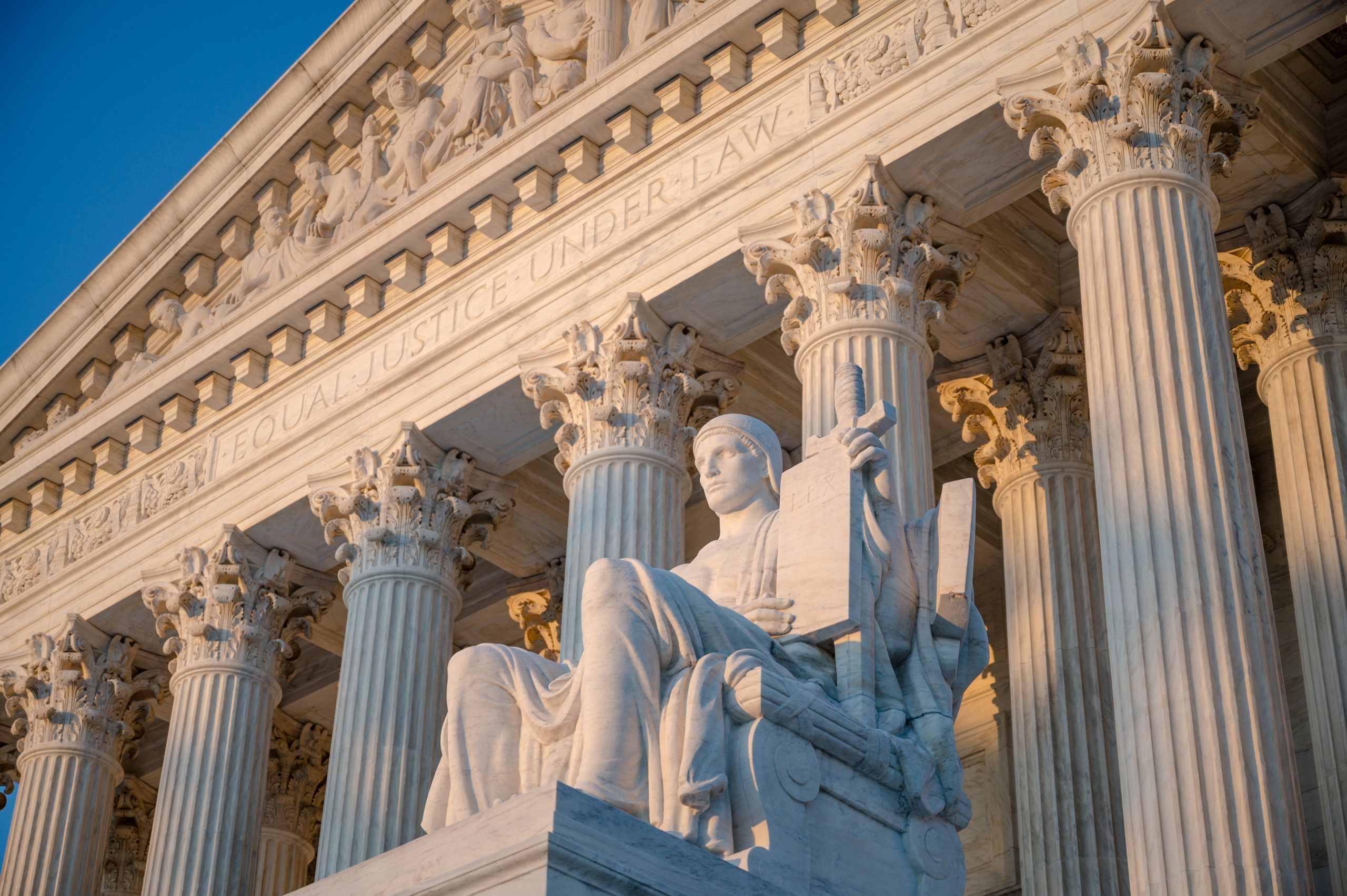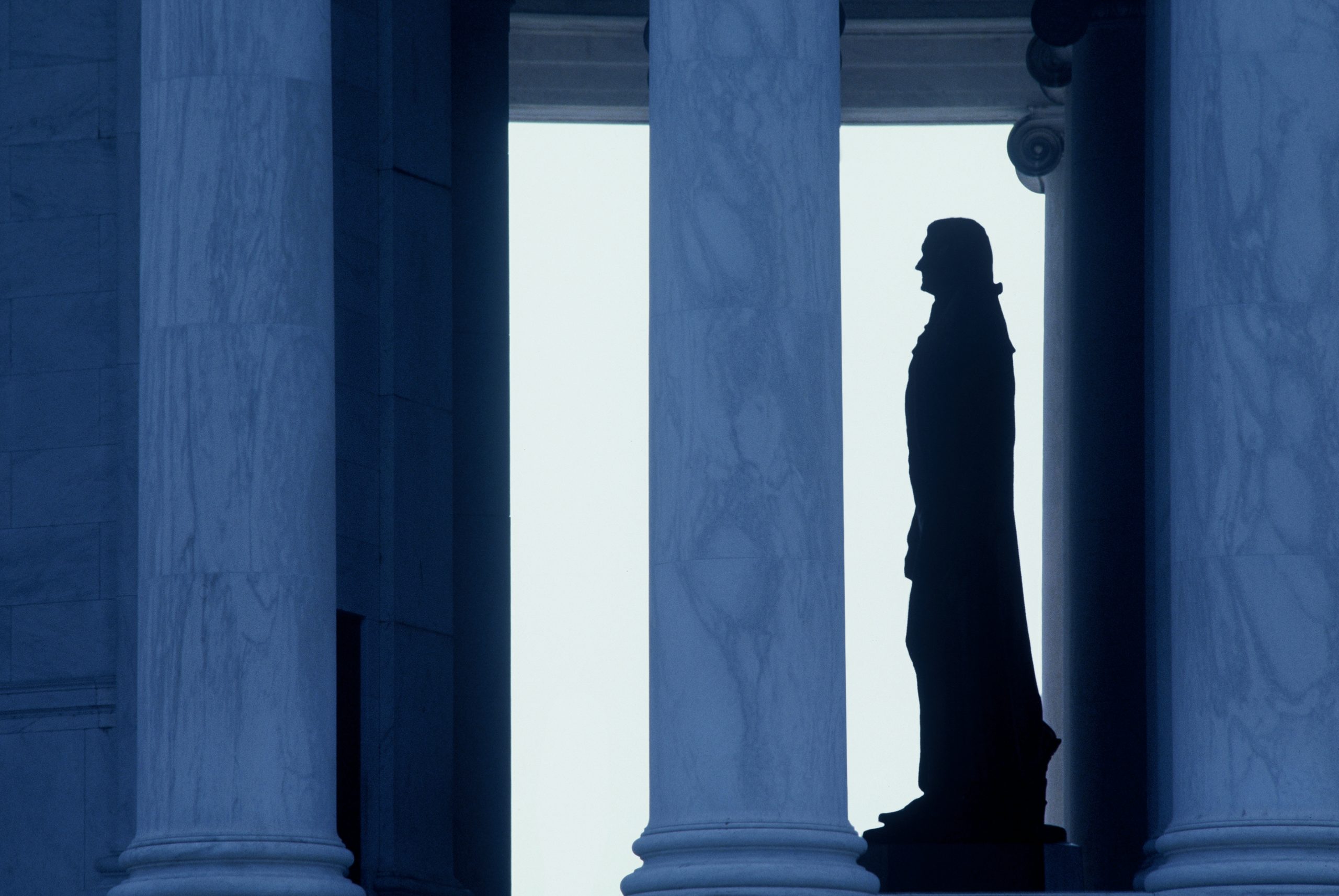Harry V. Jaffa rejected both the living constitution of the Progressives and the moral relativism of some conservatives.
The Soul of a Political Philosopher

Glenn Ellmers's new book on Harry V. Jaffa teaches urgent lessons for our fractious politics.
We present here the foreword to Claremont Institute Senior Fellow Glenn Ellmers’s new book on the life and thought of Harry V. Jaffa, available for purchase here. Responses to Ellmers’s work and Jaffa’s thought will follow.
At first sight, this is a very academic sort of book. It is about a college professor. Although it gives the best account I have read of the events in the life of its subject, Harry Jaffa, it is not mostly about events. Professor Jaffa was born in 1918 and bears the middle name “Victor.” Neither the victory in the First World War nor in the second comes into play. Jaffa lived through the Great Depression, the Korea War, and the Vietnam War. They come up, but in passing. With the rare exception of a Winston Churchill, the events in the lives of thinkers and writers are ordinary, filled not with battles but with books, not with odysseys except between the study and the classroom.
Nor is the classroom the same kind of place as the dramatic stage. Few professors prepare their classes with a beginning, a middle, and an end through which they climb to a peak of tension, understanding, and exhaustion. If you want to know what a professor thinks about a subject, the academic way is to take the course, which means sitting in a classroom for forty-five hours stretching over four months. Plus, there is plenty of reading and thinking to do outside the classroom. Recounting a lifetime like this can make a boring book.
Yet this book is not boring, because it is not about an ordinary sort of academic. Professor Jaffa was a political thinker in the school of classical political philosophy, and in him political passion was intense, qualified only by a greater devotion to knowledge. He learned from his teacher and from the classics that philosophy begins with the inescapable question: how should we live? This is the pressing form of the fundamental question, what is “good,” which itself raises questions both inescapable and urgent. The starting point for Plato and Aristotle is the opinions of ordinary people, especially the most authoritative opinions as they are expressed in the law. Thus, political philosophy.
We know from ancient political philosophy that the examination of the opinions of citizens and their laws can be dangerous, especially to the philosopher. Socrates, the father of political philosophy, was executed for treasons and impieties that he claimed he did not commit. Aristotle fled for his life from Athens to escape the same fate. Have you read the news these days about the hounding of professors from classrooms for the slightest violation of political correctness? Today as in classical times, the study of politics produces casualties. During Professor Jaffa’s own career, on his own campus, radicals destroyed a building and maimed an employee with a pipe bomb. Professor Jaffa spoke out boldly and at risk against these evils and the college administrators who surrendered to them.
Professor Jaffa did not and would not willingly kill anyone, and he died peacefully at ninety-six. But the combat in which he engaged was fierce because it was consequential. One of Professor Jaffa’s old friends exclaimed once in writing: “who will rid us of this pest of a priest?” After Henry II uttered those words, some who heard them assassinated Thomas Becket. Professor Jaffa learned nothing from the example of Becket and returned immediately to the attack.
Like that of Socrates, Professor Jaffa’s kind of philosophy operates very close to home. He had the insight of his life in his late thirties. By accident or providence, Professor Jaffa fell in love with Abraham Lincoln. He had a chance encounter with the text of the Lincoln-Douglas debates, and he saw in them the profundity of a Socratic dialogue. Those debates changed his life, the lives of his students, and the politics of our nation. From Lincoln, Jaffa worked his way back to the founding and discovered things in it that had been forgotten. He resurrected those things and made them compelling for his students, as they had been for the founders who articulated, fought for, and established the meaning of our nation. Professor Jaffa hoped for nothing less than the revival of a “scholarship of the politics of freedom,” a reversal of the relentless march toward historicism. Only by that means could both freedom and civilization be made safe. Professor Jaffa succeeded with his students, as his teacher succeeded with him. This he thought proved that a revival was as possible as it was necessary.
The central story of this book is in fact a grand drama involving the life and meaning of the greatest modern republic. Professor Jaffa loved the United States of America upon a cosmic scale. He found its justification beyond it, in the heavens, where God or the idea of God influences human actions here below. He saw that the Declaration of Independence appeals to that very place in establishing the ground of our freedom and equality.
This means that Professor Jaffa was not simply a political thinker or simply an American thinker. His interests covered, like the works of Aristotle, the whole sweep of questions available to the human mind. His life’s work was to integrate what he knew into an account of the meaning of his country.
Range
Professor Jaffa was not always the most organized teacher, but in this book one sees his strength in the classroom, how that radiated through his publications, and the range of his thought. His best classes might or might not be about the text being read. Rising from that text, from some question or comment from a student, or from who knows where, Professor Jaffa would embark on a sweep through the grand themes of political philosophy across the centuries. He could place them in order and explicate them with the familiarity of friendship—or the intensity of battle. What is a human? What is reason? What is good? What would you do if you had the power of mythical Gyges, of a ring to make you invisible to do whatever you pleased? Would you despoil or enslave others? Along a track that led through Shakespeare, Aristotle, Thomas Aquinas, Machiavelli, and the American Revolution, the professor led his students upon a circular march that ended back at the beginning, the basic question of the good.
These lectures would erupt as commonly when studying Aristotle as Lincoln, Xenophon as the founding. They would often go an hour or more beyond the schedule. No one would notice until emerging to find that it was getting dark. Then the students would retire to dinner talk about the class for hours. These classes were a microcosm of the teacher’s entire career. He was working to make wisdom practical and therefore both vital and useful, not as a tool but as a light and a guide.
One cannot understand the meaning of Professor Jaffa’s teaching without thinking about Aristotle. As Plato invented a new form of literature, the dialogue, to reproduce the conversations of Socrates, so Aristotle invented a different kind of treatise written in its own dialectical form. As one proceeds through the Ethics, Professor Jaffa’s favorite book, one sees that the definitions of things change as the book proceeds. At each stage, it is written for one who knows just that much as has been covered, and in the next stage higher understanding emerges. When one perseveres to the end of the Ethics, he finds a vision of contemplative friendship, the highest human association.
One cannot understand the charm of Professor Jaffa without reading him on Shakespeare. For the Bard, Professor Jaffa had a special love born in his study of literature at Yale in undergraduate school. His classes on Shakespeare were always superb. He had the habit of listening to great recordings of the plays (in those days, on a turntable) and picking up the needle when a passage struck his fancy or someone had a question. I remember once studying Macbeth, and the scene came where Macbeth was in the chamber of the sleeping Duncan, his house guest and kinsman, about to commit his murder to get hold of the throne. Angels and demons cry out for and against the deed. Professor Jaffa picked up the needle and said: “Does not this man live in a richly populated moral universe?” By this explication of poetry, Professor Jaffa introduced his students to that same universe. Jaffa learned from Aristotle that history is indispensable for understanding reality, but poetry at its best reveals more.
As he explored the meaning of things and of America, Professor Jaffa perceived and resisted the movement of the nation toward its current dread divisions. He saw these divisions in light of the two turning points in American history: the American Revolution that replaced monarchy with republicanism, and the Civil War that expunged slavery and reaffirmed our commitment to the principles of the revolution. Professor Jaffa drew on Lincoln, especially, to elucidate the crisis of our time. In such a crisis the whole regime and the way of life it protects are cast into doubt and controversy. Upon the outcome rests the freedom and the lives of millions.
This book explains how Professor Jaffa explored the soul of Lincoln and his response to the crisis of his time. He explains that the turning point Lincoln faced is related to the one we face today. In this, Glenn Ellmers performs a valuable service. It took Professor Jaffa decades, the teaching of many classes, and the writing of many books to develop both his understanding and his explanation. It has taken many of his students that same amount of time to understand and to extend his teaching. Glenn, one of those students, has brought it all together in one book, a splendid summary of a great life.
Development
Ellmers is particularly concerned to follow the development of Jaffa’s thought. Mind you, he does not see this as the product of outside influences upon Jaffa’s mind but rather the working out of the internal logic of his discoveries. Ellmers makes this point explicit in a long and interesting discussion of Jaffa, Lincoln, and the philosopher Hegel, connections that Jaffa brings out in A New Birth of Freedom.
Jaffa changed his mind about some important things, and Ellmers explains those in detail. Was Lincoln a refounder or a restorer? If the former, Lincoln was an original as much as or more than Thomas Jefferson in the Declaration of Independence and the other founders. This is the position of Jaffa’s groundbreaking Crisis of the House Divided. But by working his way over decades from Lincoln back through the founders, Jaffa surrenders this idea to something he came to regard as truer and nobler. Lincoln did not, he argues in New Birth of Freedom, remake America but restored and elevated it by understanding it more deeply.
Professor Jaffa was a man of argument. He loved the word “polemical,” which derives from the Greek word for war. He had fights with many famous people, such as Robert Bork, and Ellmers recounts these arguments ably. Also, he benefits greatly from three intelligent and respectful critics of Jaffa with whom Jaffa had extended arguments. They are Robert Kraynak, Michael Zuckert, and, in a different category, Charles Kesler. They all puzzle over the difference between Jaffa’s first book about Lincoln, Crisis of the House Divided, and his second, New Birth of Freedom. It is Kesler who sees best that Jaffa was working out the teachings of natural and political right found especially in Jaffa’s favorite, Aristotle, and the career of Lincoln. Even the greatest human minds do not understand as the God in Aristotle’s Metaphysics. We do not see everything at once but rather go step-by-step. The life of the scholar is a long march toward completeness; the best scholars go nearest to the end.
I am too old to have taken classes alongside Glenn Ellmers. I worked with him for many years at the Claremont Institute. Those were days of great growth and learning for all of us. Glenn matured quickly into a high-minded young man gathering knowledge and driven by noble intentions. If you want to see his character, read the “Note to the Reader” at the beginning of the book. There he names his audience, which I hope is you, the same as the audience for which Professor Jaffa aimed. Writing this book would be an achievement for anyone; it is Glenn’s finest hour to date.
For those who knew and studied with Professor Jaffa, this book is a tour through fond memories that deepens the knowledge contained in those memories. For those young members of the “natural aristoi” to whom Glenn addresses this book, it is a gateway into a journey that leads up to high understanding and noble action.
The American Mind presents a range of perspectives. Views are writers’ own and do not necessarily represent those of The Claremont Institute.
The American Mind is a publication of the Claremont Institute, a non-profit 501(c)(3) organization, dedicated to restoring the principles of the American Founding to their rightful, preeminent authority in our national life. Interested in supporting our work? Gifts to the Claremont Institute are tax-deductible.
At the crossroads of reason and revelation stands the American idea.
Harry V. Jaffa's work and teaching was not enslaved to the fashions of his day.
Reflections on Harry V. Jaffa from a grateful student.
Rescuing America is the great task of this generation's best.
Harry V. Jaffa helped save American history from Progressive historicism.






